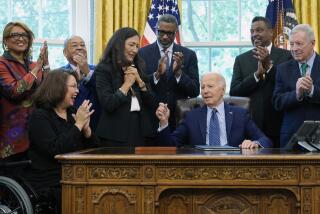Illinois Offers Its Regrets to Mormons
- Share via
SALT LAKE CITY — A delegation led by Illinois’ lieutenant governor expressed official regret Wednesday for the 1844 murder of the founder of the Mormon church and the vigilante violence that drove Mormons from the state two years later.
Democratic Lt. Gov. Pat Quinn and others met with Utah officials and leaders of the Church of Jesus Christ of Latter-day Saints on Wednesday. The meeting came a week after the Illinois House approved a resolution expressing regret for the violence, including the murder of church founder Joseph Smith Jr.
“There was a chapter in our history that we are not proud of,” Quinn said at a news conference after the private meeting with church leaders and Utah government officials, including Republican Gov. Olene Walker.
“I want to express our official regrets to members of the Church of Jesus Christ of Latter-day Saints for events that occurred in Nauvoo in 1844 and also in Carthage. The fact that people of faith were asked to leave is not something that we’re proud of.”
Church President Gordon B. Hinckley, 93, did not attend the meeting because of his wife’s death Tuesday. But James E. Faust of the three-member First Presidency said the Illinois resolution is “a message of respect and reconciliation [that] will long live in the hearts of this people.”
Illinois state Rep. Jack Franks, a Democrat, sponsored the resolution that originally asked for “the pardon and forgiveness” of Mormons. The final version simply expresses regret for the violence.
Democratic Rep. Daniel J. Burke, the resolution’s co-sponsor, said the wording was changed because some legislators balked at apologizing for something they had had nothing to do with. Burke said that since the resolution’s passage, he has heard from hundreds of Mormons thanking Illinois.
Before Wednesday’s statements, Quinn said he hoped the gesture would make Mormons feel welcome in Illinois. Each year, about 350,000 Mormons visit Nauvoo, where Smith settled, and about 51,000 Mormons live in Illinois.
Mormons never were officially expelled from Illinois, but they were driven out after Smith was killed.
In 1839, sympathetic citizens of Quincy, Ill., invited the Mormons to settle in Illinois after Missouri Gov. Lilburn Boggs issued an extermination and expulsion order against the Mormons.
In 1840, the Illinois Legislature chartered Nauvoo as a kind of country within a state, allowing the Mormons to establish their own court system and militia known as the Nauvoo Legion. Nauvoo became the largest city in the state, growing to about 20,000 by 1844.
But with its own army, courts and large voting bloc, Nauvoo began to seem a threat to some Illinois citizens. When dissidents established an anti-Smith newspaper, the Nauvoo Expositor, Smith and members of the Nauvoo Legion destroyed the presses. Smith eventually surrendered and was jailed in Carthage, Ill.
Gov. Thomas Ford vowed to protect Mormon leaders until they could get away safely with their congregation. But on the night of June 27, 1844, a mob stormed the Carthage jail and killed Smith and his brother Hyrum.
More to Read
Sign up for Essential California
The most important California stories and recommendations in your inbox every morning.
You may occasionally receive promotional content from the Los Angeles Times.













